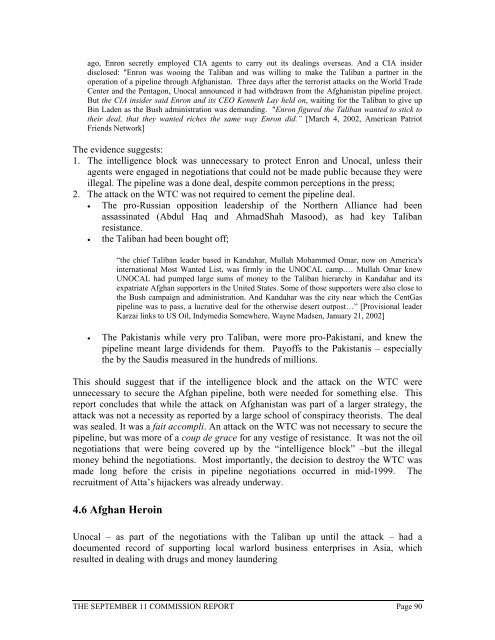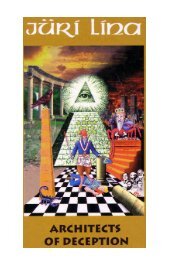- Page 1 and 2:
THE SEPTEMBER 11 COMMISSION REPORT
- Page 3 and 4:
CONTENTS List of Illustrations and
- Page 5 and 6:
8.1 Federal Reserve and the Elimina
- Page 7 and 8:
Figure 3: US Bases and the Afghan P
- Page 9 and 10:
A. Israelis have been extensively i
- Page 11 and 12:
was a major mover of illegal gold;
- Page 13 and 14:
(4) His ability to speak Hebrew; (5
- Page 15 and 16:
1. There are between 6,000 and 280,
- Page 17 and 18:
4. Documented seismic spike just pr
- Page 19 and 20:
(State Department). The German side
- Page 21 and 22:
1. the Commission for the first tim
- Page 23 and 24:
whose names repeatedly appear: Adna
- Page 25 and 26:
Preface This project started with a
- Page 27 and 28:
address the ‘loose ends’ in thi
- Page 29 and 30:
1 Unmasking the Faces Behind the Te
- Page 31 and 32:
sides of the Mossad work together w
- Page 33 and 34:
• Why would a fanatical Muslim we
- Page 35 and 36:
Prior to being in Iraq, Nick Berg d
- Page 37 and 38:
that crashed into the Pentagon on S
- Page 39 and 40: that I would soon be on their hit l
- Page 41 and 42: was a “major failure” in commun
- Page 43 and 44: 5. the actual arrest and release of
- Page 45 and 46: the upcoming attacks to Attorney Ge
- Page 47 and 48: lawsuit) context make clear the off
- Page 49 and 50: 3 Eugene Armstrong and Jack Hensley
- Page 51 and 52: that provides “technical, logisti
- Page 53 and 54: These small bits of information beg
- Page 55 and 56: of American outrage, and Muslim dis
- Page 57 and 58: with Afghanistan, and secure access
- Page 59 and 60: September the 11th?” Bush replied
- Page 61 and 62: “There were a lot of BCCI documen
- Page 63 and 64: that 2.2 trillion dollars was missi
- Page 65 and 66: of operations was Azerbaijan. (For
- Page 67 and 68: Dick Cheney’s “intelligence blo
- Page 69 and 70: to this region. Kazakhstan is repor
- Page 71 and 72: 4.2 Azerbaijan Because of the restr
- Page 73 and 74: “The elections confirmed Ilham Al
- Page 75 and 76: “In 1987, Stephen’s deal [Jacks
- Page 77 and 78: Japanese for a pipeline which would
- Page 79 and 80: "With regard to Chechnya, the main
- Page 81 and 82: Two years later, another historic m
- Page 83 and 84: “In 1996, Abu Hafs relocated to G
- Page 85 and 86: “Three of the alleged hijackers l
- Page 87 and 88: Unocal was not in a position to pro
- Page 89: switching traffic from the Russian
- Page 93 and 94: [Profits of Death (A Special FTW Se
- Page 95 and 96: “The Tengiz oil field on Kazakhst
- Page 97 and 98: Giffen and Williams were found guil
- Page 99 and 100: investigations had access to the vi
- Page 101 and 102: • US oil companies in Kazakhstan
- Page 103 and 104: Angola. Unfortunately, while the sw
- Page 105 and 106: anks were part of the same money-la
- Page 107 and 108: 5 Russian and Israeli Mafiya Before
- Page 109 and 110: source of the fabricated evidence,
- Page 111 and 112: Target Put Options Table 1 Unclaime
- Page 113 and 114: "Richard Wagner, a data retrieval e
- Page 115 and 116: On the other hand, almost always, i
- Page 117 and 118: During World War II, the two German
- Page 119 and 120: 2. seething resentment due to U.S.
- Page 121 and 122: • Board representatives from Thys
- Page 123 and 124: have purchased major ownership posi
- Page 125 and 126: • How is it that Russian, German
- Page 127 and 128: “I got the document here, on the
- Page 129 and 130: 6 Destruction of the World Trade Ce
- Page 131 and 132: was to testify in court about her r
- Page 133 and 134: 6 Analysis of videotape of the coll
- Page 135 and 136: THE SEPTEMBER 11 COMMISSION REPORT
- Page 137 and 138: Tower Two: Deaths By Company/Floor
- Page 139 and 140: 6.1 The Link between the WTC, Illeg
- Page 141 and 142:
http://sync.democraticunderground.c
- Page 143 and 144:
was used for storing files and evid
- Page 145 and 146:
The key matter for consideration an
- Page 147 and 148:
frame with concrete floors, the fir
- Page 149 and 150:
dollars worth of precious metals we
- Page 151 and 152:
7 GOLD TRADING AND MONEY LAUNDERING
- Page 153 and 154:
Chairman of the Deutsche Bank Board
- Page 155 and 156:
considerable portions of Santa Roma
- Page 157 and 158:
protected from Congressional oversi
- Page 159 and 160:
The amounts of illegal gold from al
- Page 161 and 162:
About the same time Khashoggi and A
- Page 163 and 164:
Gold Weight/Value Conversion Chart
- Page 165 and 166:
3. Create credibility for the compa
- Page 167 and 168:
Munk-SPP became a giant hotel owner
- Page 169 and 170:
100, Ellen Himelfarb; Laura Janeshe
- Page 171 and 172:
By 2001 Barrick had amassed off-bal
- Page 173 and 174:
Accounting Office, was staffed with
- Page 175 and 176:
Khashoggi on at least two occasions
- Page 177 and 178:
Federal crime or offense. So, under
- Page 179 and 180:
8 Gold-Backed Bonds, Cantor Fitzger
- Page 181 and 182:
“On August 1, 2001 eSpeed announc
- Page 183 and 184:
Curiously, the five Raytheon execut
- Page 185 and 186:
March 10 issue of Euromoney magazin
- Page 187 and 188:
“response” server. One server s
- Page 189 and 190:
New York’s telecommunications pro
- Page 191 and 192:
onds. (As an interesting note, at t
- Page 193 and 194:
links to the 1991 fraud. It was als
- Page 195 and 196:
Understandably, Soros and the Roths
- Page 197 and 198:
In addition to suspending rules whi
- Page 199 and 200:
coincidence of these two situations
- Page 201 and 202:
“Lt. Vreeland gave clues that his
- Page 203 and 204:
Congress expressed concern about Ru
- Page 205 and 206:
More important than loose cannons l
- Page 207 and 208:
What the record shows is that the $
- Page 209 and 210:
“Until 1998, Riggs owned a share
- Page 211 and 212:
emain quiet. If Ames was exposed in
- Page 213 and 214:
a company owned by Bush's former ch
- Page 215 and 216:
USACC. The remaining Board of Direc
- Page 217 and 218:
gold remains; the vaults are empty,
- Page 219 and 220:
Somehow, however, during the next t
- Page 221 and 222:
12/16/1991) (It is of interest to n
- Page 223 and 224:
“oligarchs.” In doing so, the Y
- Page 225 and 226:
events of 9/11, and the decision ta
- Page 227 and 228:
of 600 billion rubles made earlier
- Page 229 and 230:
“(Soros) has been controlled for
- Page 231 and 232:
“Often called a "state within a s
- Page 233 and 234:
“It is not the Yeltsin family in
- Page 235 and 236:
Berezovsky, a notorious critic of P
- Page 237 and 238:
ather influential figure in the Wah
- Page 239 and 240:
Again, the report demonstrates that
- Page 241 and 242:
story. On the surface of those stor
- Page 243 and 244:
9 Bank Cartel or Oil Syndicate - A
- Page 245 and 246:
1945. It was redistributed later to
- Page 247 and 248:
holding on to financial assets that
- Page 249 and 250:
powerful advisor, he was Marc Rich
- Page 251 and 252:
“London--Apr 29/99--Germany's Com
- Page 253 and 254:
President Carter did initiate a res
- Page 255 and 256:
The entire Iran-Contra affair fell
- Page 257 and 258:
“Porter Goss was a young CIA offi
- Page 259 and 260:
esides criminal activity, is their
- Page 261 and 262:
11 Whitehouse Assassins Someone in
- Page 263 and 264:
know the cities on the tour, much l
- Page 265 and 266:
"The FBI believes Israel has a spy
- Page 267 and 268:
“I hereby declare that a state of
- Page 269 and 270:
guidance, FEMA was structured to cr
- Page 271 and 272:
incoming missile attack had been pl
- Page 273 and 274:
hotel overhang. Could Reagan's woun
- Page 275 and 276:
was dining with the Bin Ladin famil
- Page 277 and 278:
murdered, one-by-one as they were f
- Page 279 and 280:
failed, maybe it was decided to let
- Page 281 and 282:
It should come as no surprise that
- Page 283 and 284:
If indeed it was Stephanowicz that
- Page 285 and 286:
ogue bankers? Research has suggeste
- Page 287 and 288:
ecame aware of what was going on an
- Page 289 and 290:
Africa. Nigeria is considered to be
- Page 291 and 292:
• former Israeli Col. Yair Klein
- Page 293 and 294:
Pelican Flight Training Center (Pro
- Page 295 and 296:
Adnan Khashoggi - is first and fore
- Page 297 and 298:
king's brother, who has "no backgro
- Page 299 and 300:
security video recording from the p
- Page 301 and 302:
there were no occupants on floors 7
- Page 303 and 304:
"Montreal, Canada - August 4, 2004
- Page 305 and 306:
• Kozeny’s contact at AIG was F
- Page 307 and 308:
Some reports have suggested that Ah
- Page 309 and 310:
There are relatively reliable sourc
- Page 311 and 312:
• his involvement with German int
- Page 313 and 314:
scandal. The Bush enterprise was ab
- Page 315 and 316:
13 Cover-up: Credibility of the Ame
- Page 317 and 318:
According to eyewitnesses, some thr
- Page 319 and 320:
An internet search on any or all of
- Page 321 and 322:
"Martin then said he was lying low.
- Page 323 and 324:
for a little boy who shouts out the
- Page 325 and 326:
“WASHINGTON, Dec. 3 - Officials a
- Page 327 and 328:
“In the case of Noriega and Gotti
- Page 329 and 330:
“….in fact as (Dan) Rather expl
- Page 331 and 332:
Herbert Allen Jr., the world's medi
- Page 333 and 334:
President Bush’s courtship of the
- Page 335 and 336:
“Further investigation and probin
- Page 337 and 338:
levers for his legendary political
- Page 339 and 340:
Additionally, another Barrick Board
- Page 341 and 342:
14 Policy and Philosophy: Democracy
- Page 343 and 344:
“As Kristol argues, strong religi
- Page 345 and 346:
equired by the Foreign Intelligence
- Page 347 and 348:
“Another advantage of the totalit
- Page 349 and 350:
“Leo Strauss is one of the icons
- Page 351 and 352:
appropriate, and decided to pursue
- Page 353 and 354:
criminals to another channel.) It m
- Page 355 and 356:
Appendix A: Banking Links with US I
- Page 357 and 358:
Appendix B: Stratesec Stratesec Inc
- Page 359 and 360:
Fasulo) crashed a Rockwell Commande
- Page 361 and 362:
Appendix C: World’s Greatest Trea
- Page 363 and 364:
egister quickly with those who have
- Page 365 and 366:
George W Bush, temporarily on the
- Page 367 and 368:
Notes 1. “Eight metric tons of pl
- Page 369 and 370:
eserves were estimated to be 100 mi
- Page 371 and 372:
Fleming and Kenneth D. Garbade, FRB
- Page 373 and 374:
emergency, suspending key provision
- Page 375 and 376:
A key consideration is the pre-9/11
- Page 377 and 378:
[Liquidity Effects of the Events of
- Page 379 and 380:
[When the Back Office Moved to the
- Page 381:
• A key witness who might provide







